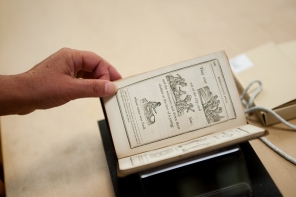Permissions and Copyright
Crediting and Citing Middlebury College Special Collections
When using our collections, we ask that you use this credit line:
Middlebury College Special Collections, Middlebury, Vermont
Need help with citations? Visit: Citing our collections.
Copyright
Except in a few special circumstances, Middlebury Special Collections does not hold the copyright to its materials and cannot grant or deny permission to use them.
You are responsible for determining the copyright status of materials you wish to use, to investigate the owner of the copyright, and to obtain permission for your use. We ask that you cite Middlebury Special Collections with the appropriate credit line provided on the top of our Permissions and Copyright page.
If you have more information pertaining to the copyright of any of our materials, we would appreciate hearing from you. Please reach out at go/asksc/.
Public Domain
Special Collections welcomes you to use materials in the public domain. For help identifying what is and is not in the public domain, see this chart, published by Cornell University.
Fair Use
The United States copyright law contains an exception for fair use of copyrighted materials, which includes the use of materials for purposes of teaching, scholarship, research, criticism, and news reporting. For guidelines on the fair use exception, refer to the United States Copyright Office.
Privacy, Publicity, and Third Party Rights
The rights of privacy and publicity are separate and distinct from copyright. While copyright laws protect the copyright owner’s property rights in the work, privacy and publicity rights protect the interests of the individuals who are the subject of the work. The right of publicity is a person’s right to control, and profit from, the use of his or her name, image and likeness. This means that any use of a person’s name, image or likeness for commercial gain is not permitted without his or her consent. The right of privacy is a person’s right to live outside of the public eye and free from the publicizing of intimate details of their life. Keep in mind that while a person’s right to privacy generally ends with his or her death, publicity rights associated with the commercial value of that person’s name, image, or likeness may continue after their death. For example, many estates and representatives of famous deceased authors, photographers, celebrities, and other well-known figures continue to control and license use of their names and likenesses.
For instance, if you want to download a copyrighted photograph containing the name or likeness of one or more individuals for use in a paper or project, in addition to determining whether your intended use requires consent from the copyright holder, and, if so, securing the copyright holder’s written permission, you may also need to secure the consent of the people who appear in the photograph in order to comply with state privacy and publicity laws.
Special Collections
Have a question?
Visit go/asksc/ or email specialcollections@middlebury.libanswers.com
Schedule a visit
go/specialvisit/
- Tel:
- (802) 443-2387
- Office:
- Library 101


